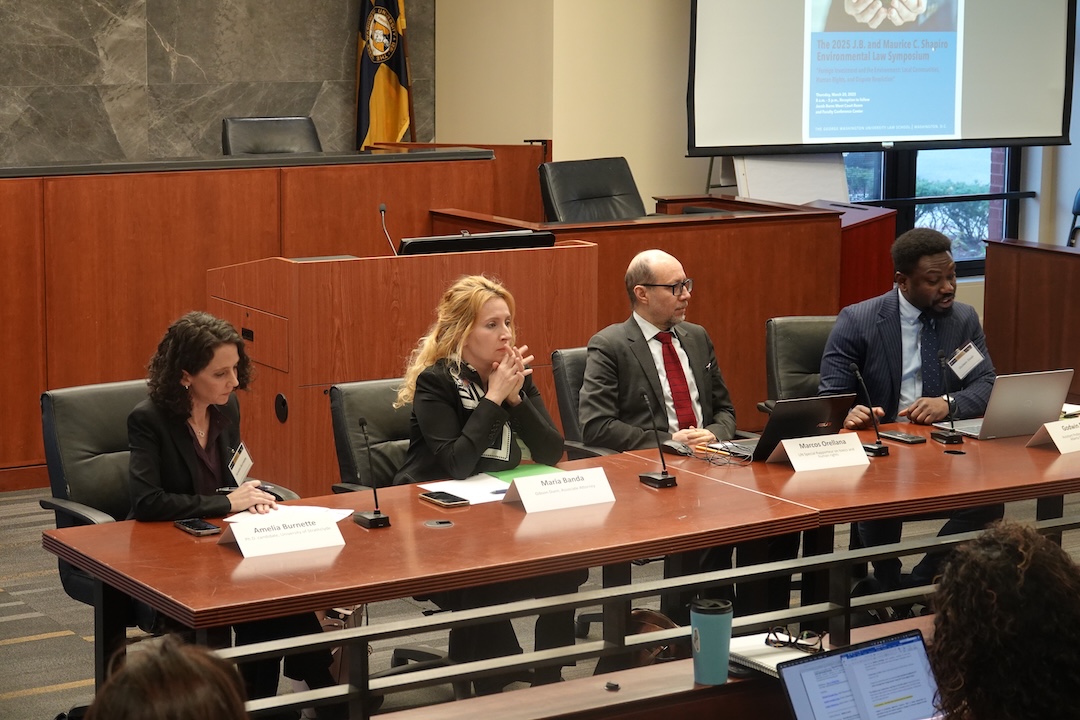The George Washington University Law School proudly hosted the 2025 J.B. and Maurice C. Shapiro Environmental Law Symposium on Thursday, March 20. This year’s symposium, titled “Foreign Investment and the Environment: Local Communities, Human Rights, and Dispute Resolution,” brought together legal experts from across the globe to discuss critical issues shaping our global community.
The symposium featured a lecture from keynote speaker, S. James Anaya, the University Distinguished Professor and Nicholas Doman Professor of International Law at the University of Colorado Law School, along with four panels exploring issues related to foreign investment, human rights, and the environment.
“This year’s Shapiro Symposium featured leading experts from around the nation and the world to address the intersection of foreign investment, human rights, and environmental protection in the context of arbitration between foreign investors and host states,” said Assistant Dean for Environmental Studies Randall Abate.”The event was a tremendous success. We are grateful to Crowell & Moring for their generous sponsorship of the post-symposium reception.”
In the first panel, “The Environment, Human Rights, and Cultural Heritage,” Amelia Burnette, Esq., a Ph.D. candidate at the University of Strathclyde, moderated a conversation with Dr. Maria Banda, an associate attorney at Gibson Dunn; Dr. Godwin Dzah, an assistant professor at the University of Alberta Faculty of Law; and Dr. Marcos Orellana, United Nations Special Rapporteur on toxics and human rights. The panelists explored standards related to socioeconomic and cultural rights; the free, prior, and informed consent (FPIC) of indigenous peoples; corporate social responsibility, and the social license to operate. They also highlighted key areas where tensions arise between sovereign rights and private interests, exploring the challenges of reconciling competing priorities in investment arbitration.
The second panel, “The Crisis of Investment Arbitration: What’s Next?”, was moderated by Ian A. Laird, Esq., co-chair of Crowell & Moring’s International Dispute Resolution Group, and included Patrick Pearsall, Esq., partner at Gibson Dunn & Crutcher LLP; Analia Gonzalez, Esq., partner at BakerHostetler; and Ladan Mehranvar, senior fellow at the Columbia Center on Sustainable Investment. The panelists discussed the challenges of protecting the environment within the current international investment law regime, offering a comprehensive overview of International Investment Law. They specifically focused on emerging trends that seek to integrate environmental values into arbitration between states and foreign investors.
The third panel, “Dispute Resolution in Investment Arbitration with Human Rights and Environmental Dimensions: What Have We Learned from Recent Case Law?”, moderated by GW Law Visiting Associate Professor and Environmental Law Fellow Giovanna Gismondi, included Dawn Yamane Hewett, Partner at Quinn Emanuel (ABILA), David L. Attanasio, Partner at Womble Bond Dickinson, International Disputes Practice (ABILA); and Ian Laird. The panelists discussed the complex relationship between environmental regulation and international investment arbitration, offering insights drawn from recent case law and highlighting the challenges faced by states in upholding environmental and human rights laws and policies within the investment arbitration framework.
The fourth panel, “Community Consultations, Environmental Protection, and Investment Projects,“ moderated by Awista Ayazi, Esq., Human Rights Litigator & Senior Legal Advisor, included Andres Dulanto Tello, Dean, Faculty of Law, Universidad Cientifica del Sur (Peru); Cherine Foty, Esq., Senior Associate, Covington & Burling LLP; and Upasana Khatri, Esq., Senior Attorney, Center for International Environmental Law. The panel explored international projects involving multiple stakeholders, including local communities whose interests and priorities may conflict with those of multinational corporations. Through analysis of case studies, it examined the environmental impacts on local communities, the status of consultation and access to environmental information under national laws, investors' obligations, non-judicial disputes related to human rights and environmental due diligence, civil liability, reputational risk, and other local issues that often create tensions among communities, investment projects, and local governments.
To learn more about the symposium visit the symposium webpage.


